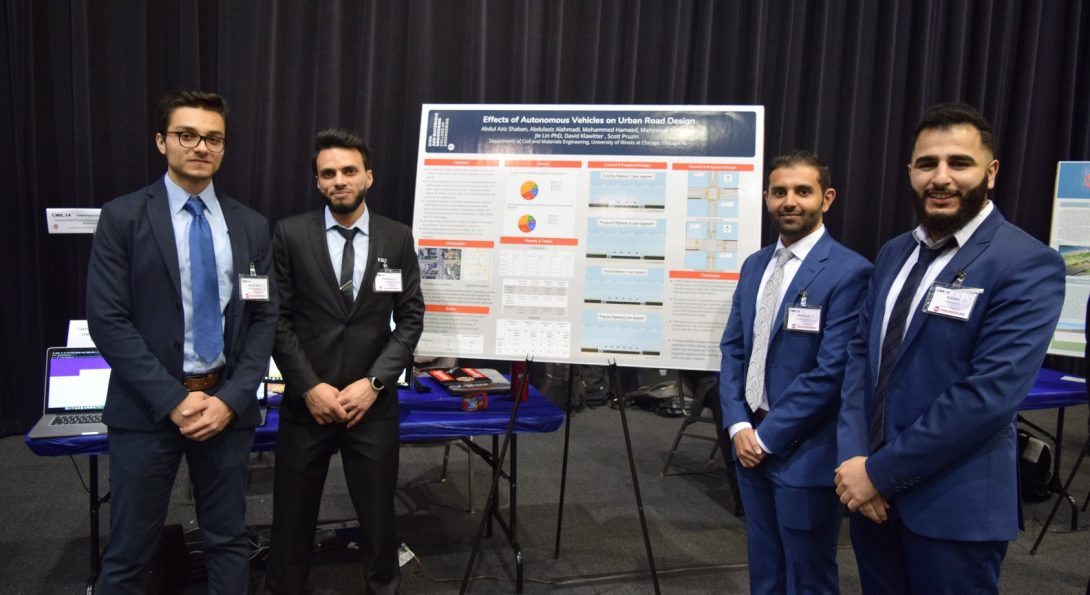CME seniors display innovation at engineering expo

story title Heading link
Seniors in the Department of Civil and Materials Engineering (CME) wrapped up two semesters of hard work as they showcased their research, creativity, and skills on April 26 during the 30th annual UIC Engineering Design Expo at the Isadore and Sadie Dorin Forum, 725 W. Roosevelt Road, Chicago.
The expo featured 21 CME student teams who brought pressing issues to the forefront of the expo with projects that wowed the attendees and judges. The projects addressed plastic pollution, the need for sustainability in the development of vacant land in Chicago, testing the mechanical properties of nanostructures, incorporating sustainability goals into the development of urban landscapes, and transportation issues at the controversial Lincoln Yards development in Chicago.
The CME students joined more than 700 College of Engineering undergraduates who completed the two-semester Senior Design Course that challenged them to solve a real-world engineering problems.
Award winners
Six teams stood out from their competition as they took home awards from the judges, who represented a variety of professionals from the Chicago region and faculty from the College of Engineering.
The Materials Engineering award went to Hengyu Li, Francisco Lopez, Fabian Carlos Acevedo, Ramez Aladdin, and Tonghao Zhang for their project titled “The Use of Plastic in Sidewalk Bricks and As a Filler in Concrete.”
The team’s goal is to make use of plastic waste and turn it into a useful source of material for improving particular cement products. The objective is to replace cement which already has a large carbon footprint in concrete with plastic for small concrete objects such as bricks and others. The use of plastic in concrete aims at both using a waste product and improving the product that it will replace. The group’s overall goal would be to create a superior product and reduce pollution at the same time.
The team of Oscar Almanza, Jesus Escobar, and George Lopez won the Site Development Engineering award for their project titled “Discovery Partners Institute Design.”
The team designed a UIC facility with a relatively small ecological footprint. The building is an extension to bridge the gap between the main campus and the Discovery Partners Institute (DPI) at a vacant 62-acre-development site in downtown Chicago. The site connects all University of Illinois students with companies, investors, and peers to encourage innovation working with the DPI. The group incorporated sustainable materials, such as triple glazed windows, recycled steel, and a rooftop irrigation system for the proposed four-story international style building.
The Structural Engineering award was presented to the team of Luke Zanoni, Ivan Ramirez, Ningmu Cao, Qiuyuan Luo, and Jeremy Harris for their project titled “Design and Fabrication of a Flexible Load Sensing Structure for Testing Mechanical Properties of Nanostructures.”
Nanostructures are smaller than the diameter of a human hair, yet have exceptional properties that can be used in engineering designs of the future. A macroscale physical prototype was 3D printed and the prototype was subjected to physical load testing to confirm the design met target stiffness criteria. The ultimate goal of the project was to complete one iteration of prototype design for a flexible, nanoscale load sensing structure.
The judges bestowed Alena Dizdari, Francisco Donoso, and Christopher Heipp the Sustainable Engineering award for their project titled “Novus Project – 46-Acre Sustainable Mega-Development.”
The project is part of a LEED Platinum certified development that incorporates green building practices through design and construction. It includes seven residential buildings, two retail and entertainment facilities, a luxury hotel, a single parking structure, and three parks. Green lawns, bike paths, athletic fields, and community gardens are also planned and designed. By incorporating sustainability goals into land development in the urban landscape, existing surrounding communities will be improved environmentally, socially, and economically.
The Transportation Engineering award was given to Sania Ali, Francine Wong, and Gustavo Yanez for their project titled “Complete Street Design on Cortland Street.”
The City of Chicago is developing plans for a new neighborhood called Lincoln Yards. This area surrounds Cortland Street, which cannot adequately support the increase of pedestrian, bicycle, transit, and motor traffic. To address the issues, the students used Complete Streets design framework to allow an easier transition to the area by bridging the inequity between different modes of transportation. The student redesign improves the transportation conditions and accommodates an increase of multimodal traffic.
The judges awarded the best prototype award to the team of Mahmoud Alsharbini, Abdulaziz Alahmadi, Mohammed Hameed, and Abdul Aziz Shaban for their project titled “A Study of the Effects of Autonomous Vehicles on Urban Road Design.”
This project focused on the effects of autonomous vehicles (AVs) on roadway design since there are new variables that designers need to consider. The team proposed an idea for intersections without traffic lights and for crosswalks to be pushed back away from the intersection to avoid any conflicts for vehicles and pedestrians. They also proposed to add a reserved lane for AVs on highways.